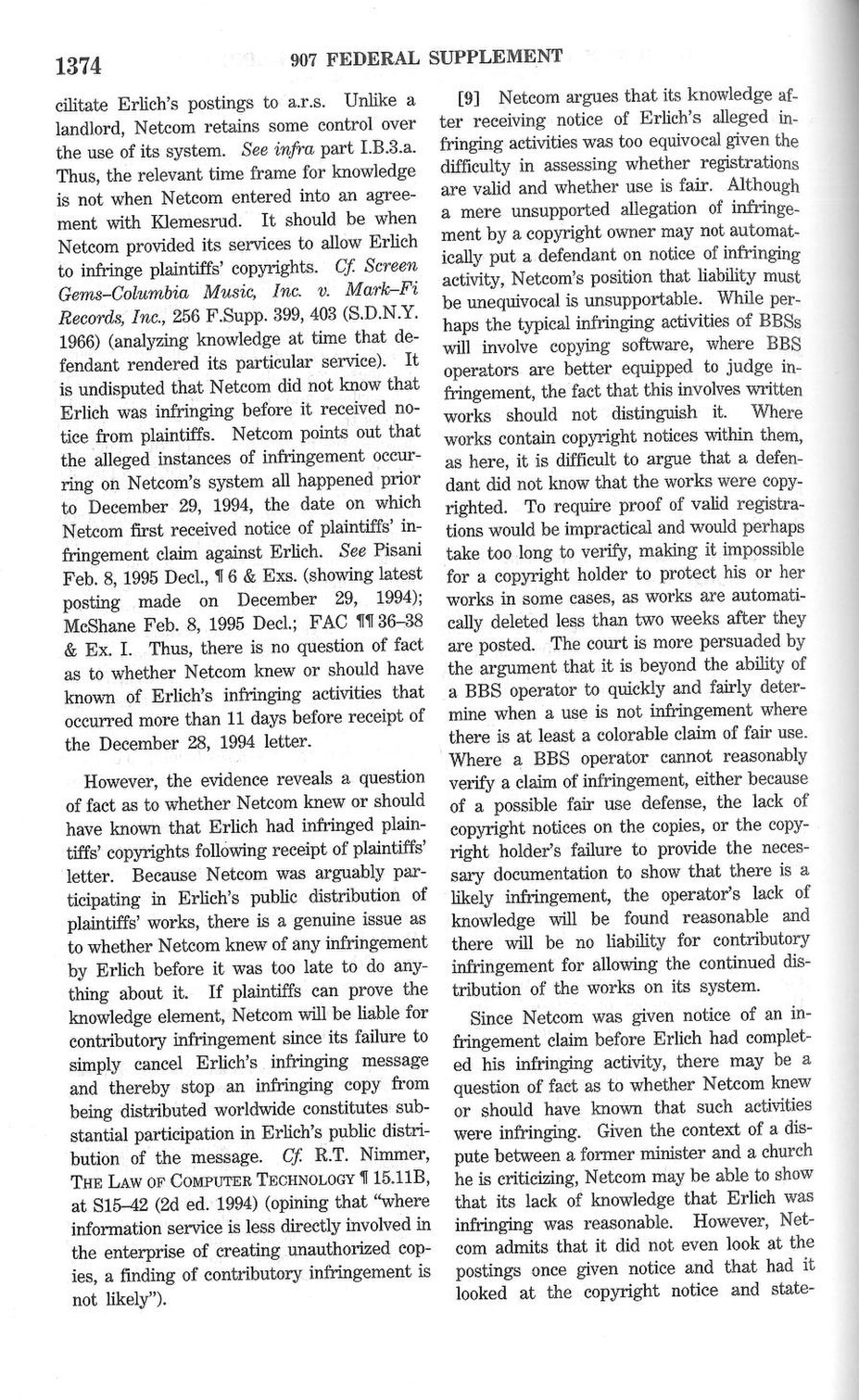cilitate Erlich’s postings to a.r.s. Unlike a landlord, Netcom retains some control over the use of its system. See infra part I.B.3.a. Thus, the relevant time frame for knowledge is not when Netcom entered into an agreement with Klemesrud. It should be when Netcom provided its services to allow Erlich to infringe plaintiffs’ copyrights. Cf. Screen Gems-Columbia Music, Inc. v. Mark-Fi Records, Inc., 256 F.Supp. 399, 403 (S.D.N.Y.1966) (analyzing knowledge at time that defendant rendered its particular service). It is undisputed that Netcom did not know that Erlich was infringing before it received notice from plaintiffs. Netcom points out that the alleged instances of infringement occurring on Netcom’s system all happened prior to December 29, 1994, the date on which Netcom first received notice of plaintiffs’ infringement claim against Erlich. See Pisani Feb. 8, 1995 Decl., ¶ 6 & Exs. (showing latest posting made on December 29, 1994); McShane Feb. 8, 1995 Decl; FAC ¶¶ 36–38 & Ex. I. Thus, there is no question of fact as to whether Netcom knew or should have known of Erlich’s infringing activities that occurred more than 11 days before receipt of the December 28, 1994 letter.
However, the evidence reveals a question of fact as to whether Netcom knew or should have known that Erlich had infringed plaintiffs’ copyrights following receipt of plaintiffs’ letter. Because Netcom was arguably participating in Erlich’s public distribution of plaintiffs’ works, there is a genuine issue as to whether Netcom knew of any infringement by Erlich before it was too late to do anything about it. If plaintiffs can prove the knowledge element, Netcom will be liable for contributory infringement since its failure to simply cancel Erlich’s infringing message and thereby stop an infringing copy from being distributed worldwide constitutes substantial participation in Erlich’s public distribution of the message. Cf. R.T. Nimmer, The Law of Computer Technology ¶ 15.11B, at S15-42 (2d ed. 1994) (opining that “where information service is less directly involved in the enterprise of creating unauthorized copies, a finding of contributory infringement is not likely”).
Netcom argues that its knowledge after receiving notice of Erlich’s alleged infringing activities was too equivocal given the difficulty in assessing whether registrations are valid and whether use is fair. Although a mere unsupported allegation of infringement by a copyright owner may not automatically put a defendant on notice of infringing activity, Netcom’s position that liability must be unequivocal is unsupportable. While perhaps the typical infringing activities of BBSs will involve copying software, where BBS operators are better equipped to judge infringement, the fact that this involves written works should not distinguish it. Where works contain copyright notices within them, as here, it is difficult to argue that a defendant did not know that the works were copyrighted. To require proof of valid registrations would be impractical and would perhaps take too long to verify, making it impossible for a copyright holder to protect his or her works in some cases, as works are automatically deleted less than two weeks after they are posted. The court is more persuaded by the argument that it is beyond the ability of a BBS operator to quickly and fairly determine when a use is not infringement where there is at least a colorable claim of fair use. Where a BBS operator cannot reasonably verify a claim of infringement, either because of a possible fair use defense, the lack of copyright notices on the copies, or the copyright holder’s failure to provide the necessary documentation to show that there is a likely infringement, the operator’s lack of knowledge will be found reasonable and there will be no liability for contributory infringement for allowing the continued distribution of the works on its system.
Since Netcom was given notice of an infringement claim before Erlich had completed his infringing activity, there may be a question of fact as to whether Netcom knew or should have known that such activities were infringing. Given the context of a dispute between a former minister and a church he is criticizing, Netcom may be able to show that its lack of knowledge that Erlich was infringing was reasonable. However, Netcom admits that it did not even look at the postings once given notice and that had it looked at the copyright notice and state-
